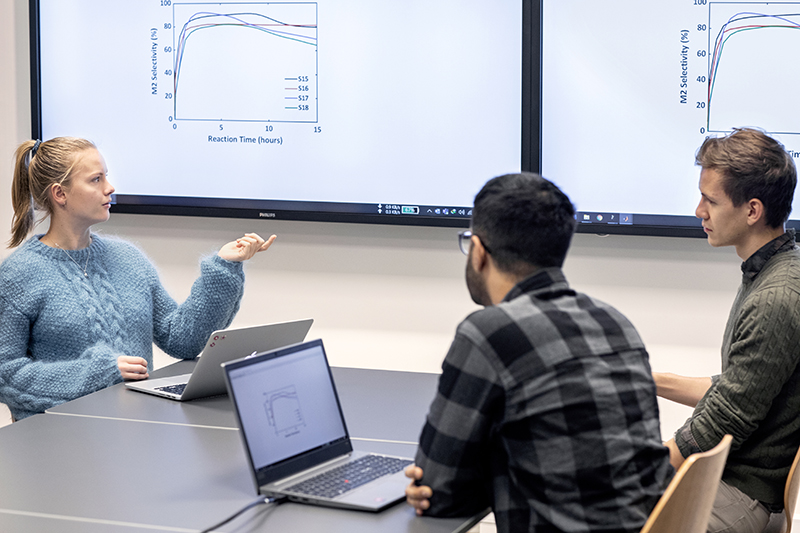What will you learn? - Sustainable Chemical and Biochemical Engineering - Master's Programme
What will you learn?

Through this multidisciplinary degree you will obtain crucial and sought-after expertise and knowledge within sustainable chemical and biochemical process engineering to ensure zero emissions to the environment, energy efficiency and use of renewable resources and raw materials.
You will learn:
- Advanced knowledge of chemical engineering, chemistry or biotechnology, with specialization in one of the fields
- Relevant knowledge within sustainability, economy and management topics, and how these can be integrated in advanced technical / engineering problem solving ensuring the ethical and life-cycle perspective
- How to apply knowledge in mathematics, natural sciences, technology, and ICT-topics to solve advanced technological and engineering problems to develop of innovative and sustainable processes
- Advanced knowledge of research and development work, working methods used by engineers, as well as project execution and working in interdisciplinary teams
- Relevant knowledge about plant operation and safety
Learning outcomes
Learning outcomes
Læringsutbytte
Kunnskap
A candidate who has completed his or her qualification should have the following learning outcomes defined in terms of knowledge, skills and general competence:
A candidate that has obtained the Master in science in Sustainable Chemical and Biochemical Engineering (MTSCHEBI) will have a broad base and a research-based specialization. The program is oriented towards training engineers with both an academic and practical and operational outlook on their profession, with sustainability as an overarching principle. The topical direction of the education can be in one of the three main electives in the program (Chemistry, Chemical Engineering or Biotechnology and Food Science), and further specialization is available within each direction.
The candidate
- has advanced knowledge of chemistry, chemical engineering or biotechnology, with specialization in a sub-field
- has good knowledge in mathematics, natural sciences, technology and ICT-topics, and how these can be used to solve advanced technological or engineering problems
- has advanced knowledge of research and development work as well as working methods used by engineers
- has relevant knowledge in sustainability, economy and management topics, and how these can be integrated in advanced technical/engineering problem solving
- has relevant knowledge about plant operation and safety
Ferdigheter
The candidate
- is able to develop and implement innovative solutions to relevant problems
- can identify, plan and execute advanced tasks and projects, both independently and in interdisciplinary groups
- masters a selection of advanced theoretical or numerical methods or experimental techniques
- can perform independent critical assessments of methods and results
- can analyze and design safe and sustainable operation of plants and equipment
- can renew and develop his/her scientific competence – independently and/or via courses
Generell kompetanse
The candidate
- has insight into environmental, health-related, societal and economic consequences of products, solutions and activities, and can see these in an ethical and life-cycle perspective
- can locate and utilize relevant information resources and carry out critical evaluation of sources and contents
- can communicate advanced technological knowledge both with specialists and a broader audience written as well as orally and masters the terminology of chemical engineering
- can collaborate with others and contribute to interdisciplinary collaboration
- understands the importance of life-long learning
- can contribute to innovation and entrepreneurship through taking part in the development of sustainable and useful solutions, processes or systems
- can reflect on his/her own professional activity, also in teamwork and a multidisciplinary context, and can adapt this to the relevant situation
